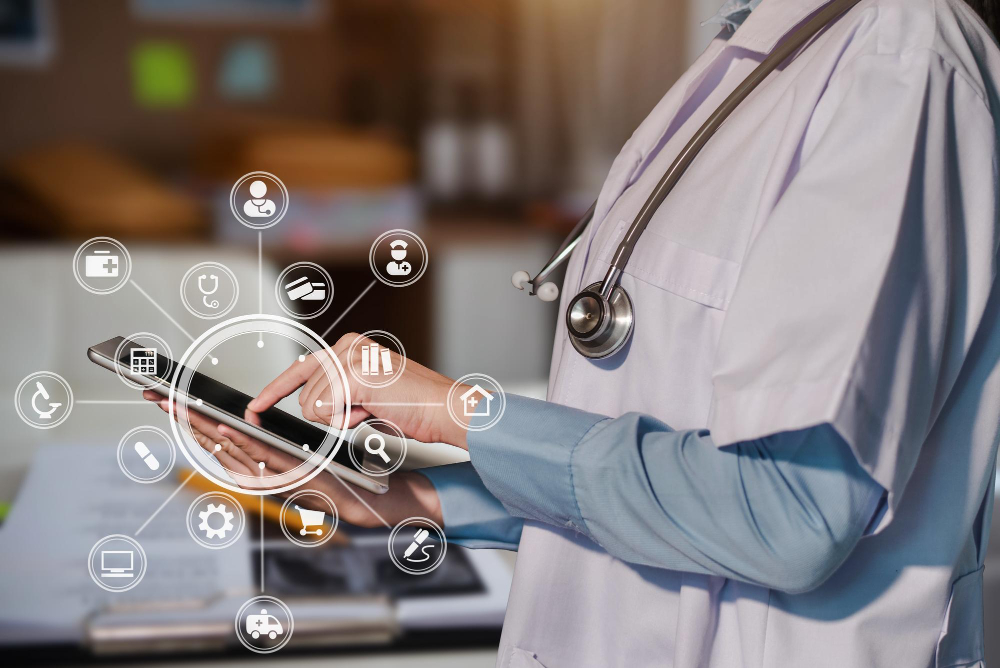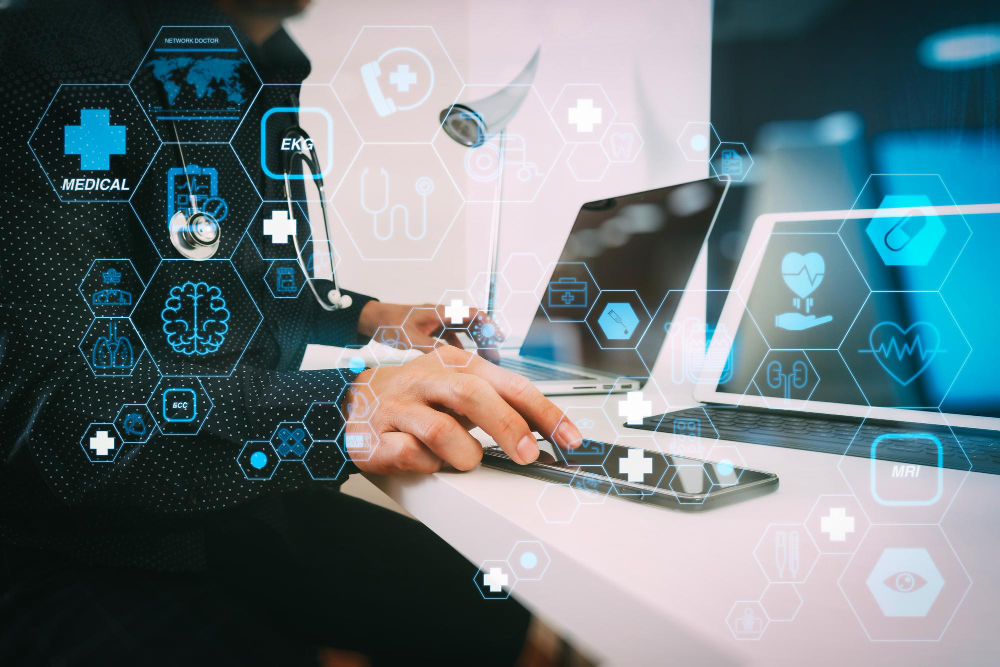
Insights
Benefits of Interoperable Systems in Healthcare IT: How Tiga Succeed?
In today's rapidly evolving healthcare ecosystem, the focus has changed beyond hospitals to encompass a broader range of healthcare providers, including pharmacies, laboratories and clinics. This shift has highlighted the urgent need for interoperable systems that seamlessly connect these organizations, promoting better patient care, streamlined operations and improved outcomes.
Interoperability is a tool that makes our work more accessible and a necessity. The inability of systems to work together in harmony can cause considerable problems in the digitalized healthcare ecosystem. These problems affect the patient's treatment process and play a vital role in the inability to produce academic and scientific studies.

So, What Is Interoperability?
Interoperability, derived from the Latin words ‘inter’ (between) and ‘operari’ (to work), essentially means the ability of different systems, devices or applications to work together and exchange information effectively. In healthcare, interoperability has a vital importance.
With interoperability, the terminology of healthcare data can be standardized, which makes healthcare professionals understand each other much better. Also, patient records can be effortlessly shared between different platforms, enabling timely and accurate data flow. From smartphones to smartwatches, interoperability allows devices and systems to integrate seamlessly, giving us the intelligent and connected world we live in today.
Interoperable systems bring us many benefits, such as seamless communication, increased efficiency, enhanced physician and patient experience and technological advancements.
The Importance of Interoperability in Healthcare
As we have mentioned, interoperability refers to the ability of different systems and technologies to exchange, interpret and collaboratively use data meaningfully.
Imagine if your entire medical history is recorded across different hospitals and private clinics and each healthcare institution cannot reach the records of the other. Frustrating. Without the interoperable healthcare system we have created, you would be in this situation and suffering all the possible problems.
Interoperability aims to bridge these divides to improve patient care and optimize healthcare efficiency. In this context, we are instrumental in building this bridge and enabling health authorities, regulators, patients and pharmacies to work together interoperably.
To achieve this universal communication, we need universal standards. Think of it as creating a dictionary every system refers to and ensuring uniformity.
With advances in artificial intelligence and machine learning, the horizon of interoperability is expanding. It is no longer just about communication; it is about anticipating the patient, healthcare authorities and regulators’ needs and delivering proactive governance. Why does interoperability matter? Interoperability is crucial in healthcare for several reasons:
Data-driven Decision Making
Interoperable systems pave the way for healthcare authorities to foresee the possible scenarios of healthcare decisions and potential illnesses. Besides, not only the health authorities themselves but physicians can also make more informed choices and, at the same time, be aware of better treatment management. They can organize treatments more effectively because they also have access to comprehensive patient histories.
Streamlined Operations
Interoperable systems increase the operational efficiency of healthcare organizations. This reduces the administrative burden, optimizes processes, enhances efficient planning, saves tens of thousands of trees from being cut down and paves the way for a much easier and more efficient archiving.
Improved Patient Engagement
Patients easily access their data, such as lab results, tests and prescriptions. Or they can quickly get or update a hospital appointment using their mobile phone. Interacting with health data encourages engagement. Ultimately, this leads to improved health outcomes.

Benefits of Interoperable Systems in Healthcare
Improved Patient Care
Interoperability ensures patient care transitions are seamless. When systems communicate, data flows effortlessly. Patients can access their data, from lab results to blood tests and have a healthier relationship with their physicians. This, in turn, leads to better treatment.
With seamless data flow, healthcare providers get a 360-degree view of a patient's health. This results in timely and accurate care. Wouldn't it be comforting to know that your health record speaks for you no matter which hospital or healthcare provider you go to?
At Tiga, we provide health authorities and regulators on account of citizens with this tremendous system. With personalized patient care, one can track your health journey and take that data wherever one goes with their mobile phone. And there is no chance for your data to be lost in archives. It can be utilized for years without getting lost. Our highly interoperable and longitudinal systems make it much easier for one's physician to provide the best treatment for all citizens.
Improved Efficiency
Imagine the time saved when physicians don't have to wait for patient records or receive real-time updates on patient health. Efficiency is not just about speed but also about making well-informed decisions quickly.
On top of all this, you can view your prescription on your phone when you leave your hospital and quickly access your medicines when you go to the pharmacy. Thanks to the system we have developed, you can learn the difference between the prices of equivalent medicines and make your choices accordingly.
Research and Innovation
Unified data systems pave the way for analytics, research and innovation. It's like giving scientists and innovators a richer palette of colors to paint future healthcare breakthroughs.
Thanks to the data we anonymize, many researchers, scientists and academics can study diseases, which opens the door for innovation.
It also allows health authorities and regulators to conduct significant research, from bed vacancy rates to hospital projections, human resources and facility planning, enabling them to shape the future with us.

How Tiga Become Interoperable?
Interoperability between hospitals, pharmacies and other healthcare facilities is a technological ecosystem and an imperative arising from a patient care need. By building an interoperable healthcare ecosystem through the systems we have developed at Tiga, we can ensure that patients receive timely, safe and efficient care regardless of where they interact with the healthcare system. So how did we succeed?
Standardization
We adopt standard data formats such as HL7 organization and FHIR standards, which could pave the way for smoother data exchange. As the healthcare IT landscape continues to evolve organizations need to enhance these standards to ensure the seamless exchange and integration of healthcare data, just like us!
Collaboration
We engage all stakeholders, including health authorities, regulators, healthcare facilities, physicians, providers, public health insurance systems and reimbursement institutions, third-party partners and pharmaceutical stakeholders in designing interoperable systems. At the heart of this transformation lies the collaboration and engagement of these stakeholders in designing and implementing interoperable systems that can significantly enhance healthcare delivery.
Training
We organize regular training regarding our Tiga’s products and solutions for healthcare professionals on the importance of interoperability and how to use interoperable systems and communication of all updates to healthcare professionals and pharmacists through dashboards in the applications.
The Importance of Data Exchange in Modern Healthcare: HL7 and FHIR
Adopting standardized data formats is not just a trend but a necessity. HL7 and FHIR have proven their capabilities. The path to a data-driven healthcare future is clear and these standards are pioneering. So, what are these standards? Let's explain!
What Is HL7?
HL7, which stands for Health Level Seven International, is an international and non-profit organization for setting electronic health data standards between different health systems. It is designed to assess the standards that such systems can communicate with each other and share critical patient information, making healthcare delivery more efficient, secure and coordinated.
It provides a 'comprehensive framework and related standards for exchanging, integrating, sharing and retrieving electronic health information that supports clinical practice and managing, delivering and evaluating health services.' 1
From lab reports to medical imaging, from data anonymization to Electronic Health Records (EHRs), HL7 ensures that data is structured and communicated consistently. It is also an indispensable part of interoperable systems.
What Is FHIR?
Another critical element is FHIR. FHIR, which stands for 'Fast Healthcare Interoperability Resources', is an interoperability standard intended to facilitate the exchange of healthcare information between healthcare providers, patients, caregivers, payers, researchers and anyone else involved in the healthcare ecosystem.' 2
It stands for the electronic exchange of healthcare information. It represents the next generation of HL7 standards and is designed to bring the capabilities of modern web technologies to the world of healthcare data exchange.
The primary goal of FHIR is to facilitate interoperability between different healthcare systems. It aims to simplify and simplify the integration process than previous standards.
![]()
As Tiga, How Did We Manage to Build Interoperable Systems?
At Tiga, our primary goal is to develop software and the best solutions for ensuring seamless and efficient data flow across all levels of healthcare to ensure optimal healthcare and streamlined operations.
We inventory all existing systems, including their technologies and functionalities, to make this happen. We adopt international standards like HL7 organization and FHIR and ensure all data comply with these standards for seamless exchange.
Besides, we understand the data structures of each participating system and find and fix discrepancies or errors that can be corrected before full-scale implementation, which is clinic data management. Interoperability is crucial in modern healthcare.
By connecting physicians, patients, hospitals, the pharmaceutical ecosystem and all of the healthcare stakeholders, we aim to revolutionize the healthcare landscape, ensuring accurate, timely and relevant information for those who need it because we want to shape the future together with you, always!
1,2 “Health Level Seven International.” About Health Level Seven International | HL7 International, www.hl7.org/about/index.cfm?ref=nav. Accessed 27 Aug. 2023.